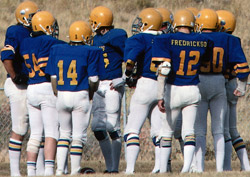(Republished with permission from the St. Louis Post-Dispatch. This article originally ran in the Health & Fitness section on Monday, July 24, 2006.)

As schoolchildren start to practice for fall sports in the sweltering St. Louis heat, it’s important to take steps to prevent heat exhaustion.
Heat exhaustion occurs when the body cannot cool itself properly during periods of extreme heat and excessive sweating without adequate replacement of fluid and salt. If untreated, it can lead to heat stroke.
Heat stroke can occur in healthy individuals during strenuous exercise or those with poor temperature regulation during extreme heat, such as infants and the elderly. Even with emergency treatment, heat stroke can lead to organ failure and death.
Children and teenagers adjust more slowly than adults to changes in environmental heat, produce more heat with activity than adults and sweat less. They also may not think to rest or drink enough fluids when playing sports or exercising. Humidity also is a contributing factor in heat exhaustion.
Heat illnesses can affect any child, but those who have chronic health problems, take certain medications, are overweight or wear heavy clothing are more susceptible. Football players are prone to heat illness because their uniforms cover nearly the whole body and practice often begins when daytime temperatures are at their highest.
To prevent heat exhaustion, have children drink plenty of water and sports drinks during outdoor activities on hot days, and teach them to take breaks to drink or wet themselves down with a hose or sprinkler. Avoid giving them caffeinated drinks, which can lead to dehydration. Make sure to dress the child in light-colored, lightweight, loose-fitting clothing and use sunscreen of at least 15 SPF.
Some signs of heat exhaustion include:
- Muscle cramps or muscle aches.
- Pale, moist skin.
- Fatigue or weakness.
- Nausea, vomiting and diarrhea.
- Headache.
- Anxiety or irritability.
- Feeling faint or dizzy.
- Heat stroke can include all of the above signs, but also:
- Body temperature greater than 104 degrees.
- Changes in mental status.
- Seizures.
- Unstable blood pressure and breathing problems.
If you suspect heat exhaustion in a child or teen, move him to a cool place to rest and remove excess clothing. Put cool cloths, cold water or ice packs on the skin and provide a sports drink containing salt and sugar. If the child improves, let him rest in a cool place for the rest of the day. If there is no immediate improvement, the child cannot drink fluids or is getting worse, call 911.
Dr. Robert Kregenow is an emergency room physician at St. Louis Children’s Hospital and a clinical instructor in pediatrics at Washington University School of Medicine.
Copyright 2006 St. Louis Post-Dispatch, Inc.